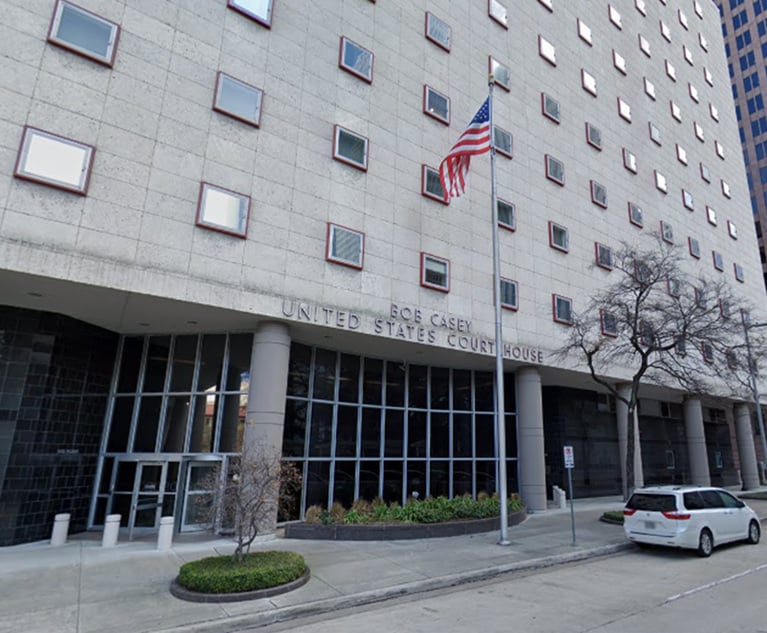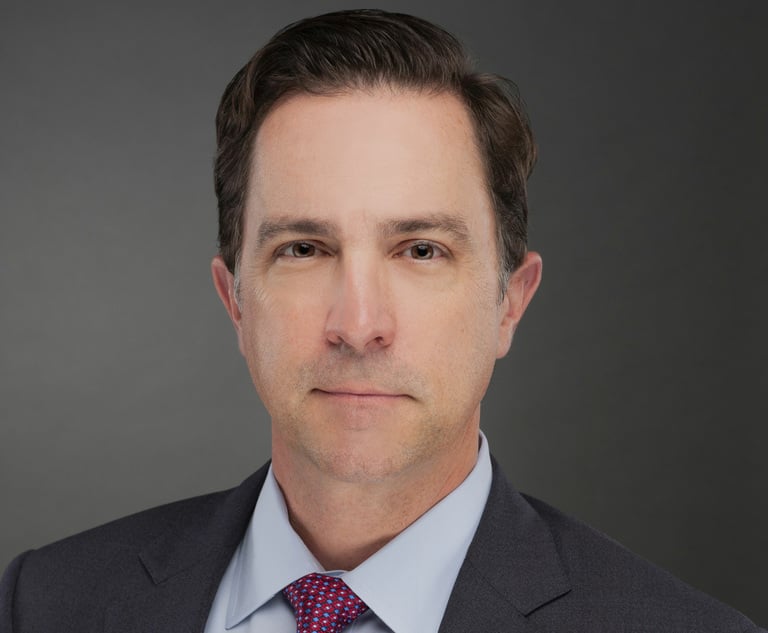Are Women More Prone to Call Foul? Group Launches Online Resource for Women Whistleblowers
A group of writers, graphic designers and activists launch Women Whistleblowers to help women who are considering blowing the whistle on their employers.
February 01, 2018 at 02:03 PM
5 minute read

Houston is headquarters for Women Whistleblowers, a new online resource and community aimed at “bringing whistleblowers out of the shadows,” educating people about the contributions of women whistleblowers, and connecting potential whistleblowers with lawyers.
Tasha Mudd, a writer who helped launch Women Whistleblowers in October, said the idea for the website and community arose last year when she and some friends were talking over lunch about the “absurdity” of for-profit prisons.
“While looking into whistleblowing we simply noticed how many great whistleblowers were women. It just seemed like a really strong and simple concept for a website and to build a supportive community via Facebook,” Mudd, who recently moved to Zurich, Switzerland, from Houston, wrote in response to questions.
The community is for women who seek to expose corporate and government fraud.
Mudd said she organized the website and networking group with friends who are writers, bloggers, graphic designers and activists. The group includes a web designer in Shanghai, a creative director who works in Houston and the United Kingdom, and writers in New York and Seattle. They are looking for more writers, and Women Whistleblowers is talking to law firms in New York, Washington, D.C., Florida and Ohio about a partnership, Mudd said. She said lawyers would write articles for the website, offer legal advice and handle whistleblower litigation for women.
Since the website was launched in late October, Mudd said the organization has received more than 20 calls from women with questions about whistleblowing.
The website features a Top 10 list of women whistleblowers, which includes Houstonian Sherron Watkins, who worked at Houston's Enron Corp. and reported possible accounting irregularities to then-chairman Ken Lay in 2001. Enron collapsed, and Watkins was a prosecution witness during the 2006 criminal trial of Lay and former chief executive officer Jeffrey Skilling.
On the website, Women Whistleblowers suggests women make great whistleblowers because they are less tolerant of business risk, are typically not part of the good-old-boy network at work, and also are more likely to protect people in weaker positions.
So what do Texas lawyers think about the assertion that women make great whistleblowers? Three employment law veterans said they don't consider whistleblower litigation to be disproportionately associated with women.
Michael Clark, special counsel at Duane Morris in Houston who does litigation including False Claims Act work, said he is not entirely convinced women are necessarily in position to be better whistleblowers. “I can see in this day and age, a woman might be more empowered, but I'm not sure,” he said.
Clark said a great whistleblower is simply someone who is in a position to have knowledge to blow the whistle. “I really try to resist stereotyping,” he said.
Kim Moore, an employment law partner in Strasburger & Price in Frisco, said whistleblowing is very case-specific and not necessarily linked to women or men, although she notes that women working in the health care industry are often in a position to bring whistleblower claims. “But, I've certainly had cases in the financial sector where it's a lot of men being in situations where they are more likely to be in position to be a whistleblower,” Moore said.
Mark Siurek, an employment lawyer who is managing partner of Warren & Siurek of Houston, said he sees a 50/50 split in gender when it comes to whistleblowers. “I don't see it gender-specific,” he said, noting like Clark that a whistleblower is someone in position to know things.
But Siurek said a website such as Women Whistleblowers can be very useful. “It's kind of a resource or safe harbor for women to go to. It's a great idea. Trust me, I love that,” he said.
Sexual harassment and assault claims and the “#MeToo” movement have been front and center in recent months, but Siurek said those claims are different from reporting corporate or government wrongdoing. “Women who are reporting sexual misconduct or some sort of workplace discrimination in the form of harassment, they aren't whistleblowers,” he said.
Robert Patten, president and chief executive officer of the Taxpayers Against Fraud Education Fund, a Washington, D.C.-based nonprofit “dedicated to combating fraud against the government,” said his organization does not keep statistics on the gender of whistleblowers, although he said he can think of several major False Claims Act cases in recent years in which the whistleblower was a woman.
“It's common for women to be whistleblowers in these cases,” he said.
Patten said, meanwhile, that he is seeing more and more women practitioners in the employment area, although has no more than anecdotal support that women are more likely to be whistleblowers.
This content has been archived. It is available through our partners, LexisNexis® and Bloomberg Law.
To view this content, please continue to their sites.
Not a Lexis Subscriber?
Subscribe Now
Not a Bloomberg Law Subscriber?
Subscribe Now
NOT FOR REPRINT
© 2025 ALM Global, LLC, All Rights Reserved. Request academic re-use from www.copyright.com. All other uses, submit a request to [email protected]. For more information visit Asset & Logo Licensing.
You Might Like
View All
JCPenney Seeks Return of More Than $1.1M From Jackson Walker For Bankruptcy Work
3 minute read
Ex-Appellate Court Judges Launch Boutique Focused on Plaintiffs Appeals
2 minute read
O'Melveny, White & Case, Skadden Beef Up in Texas With Energy, Real Estate Lateral Partner Hires
5 minute read
Chamberlain Hrdlicka Taps a New Leader as Firm Follows Succession Planning Path
3 minute readTrending Stories
- 1Two Wilkinson Stekloff Associates Among Victims of DC Plane Crash
- 2Two More Victims Alleged in New Sean Combs Sex Trafficking Indictment
- 3Jackson Lewis Leaders Discuss Firm's Innovation Efforts, From Prompt-a-Thons to Gen AI Pilots
- 4Trump's DOJ Files Lawsuit Seeking to Block $14B Tech Merger
- 5'No Retributive Actions,' Kash Patel Pledges if Confirmed to FBI
Who Got The Work
J. Brugh Lower of Gibbons has entered an appearance for industrial equipment supplier Devco Corporation in a pending trademark infringement lawsuit. The suit, accusing the defendant of selling knock-off Graco products, was filed Dec. 18 in New Jersey District Court by Rivkin Radler on behalf of Graco Inc. and Graco Minnesota. The case, assigned to U.S. District Judge Zahid N. Quraishi, is 3:24-cv-11294, Graco Inc. et al v. Devco Corporation.
Who Got The Work
Rebecca Maller-Stein and Kent A. Yalowitz of Arnold & Porter Kaye Scholer have entered their appearances for Hanaco Venture Capital and its executives, Lior Prosor and David Frankel, in a pending securities lawsuit. The action, filed on Dec. 24 in New York Southern District Court by Zell, Aron & Co. on behalf of Goldeneye Advisors, accuses the defendants of negligently and fraudulently managing the plaintiff's $1 million investment. The case, assigned to U.S. District Judge Vernon S. Broderick, is 1:24-cv-09918, Goldeneye Advisors, LLC v. Hanaco Venture Capital, Ltd. et al.
Who Got The Work
Attorneys from A&O Shearman has stepped in as defense counsel for Toronto-Dominion Bank and other defendants in a pending securities class action. The suit, filed Dec. 11 in New York Southern District Court by Bleichmar Fonti & Auld, accuses the defendants of concealing the bank's 'pervasive' deficiencies in regards to its compliance with the Bank Secrecy Act and the quality of its anti-money laundering controls. The case, assigned to U.S. District Judge Arun Subramanian, is 1:24-cv-09445, Gonzalez v. The Toronto-Dominion Bank et al.
Who Got The Work
Crown Castle International, a Pennsylvania company providing shared communications infrastructure, has turned to Luke D. Wolf of Gordon Rees Scully Mansukhani to fend off a pending breach-of-contract lawsuit. The court action, filed Nov. 25 in Michigan Eastern District Court by Hooper Hathaway PC on behalf of The Town Residences LLC, accuses Crown Castle of failing to transfer approximately $30,000 in utility payments from T-Mobile in breach of a roof-top lease and assignment agreement. The case, assigned to U.S. District Judge Susan K. Declercq, is 2:24-cv-13131, The Town Residences LLC v. T-Mobile US, Inc. et al.
Who Got The Work
Wilfred P. Coronato and Daniel M. Schwartz of McCarter & English have stepped in as defense counsel to Electrolux Home Products Inc. in a pending product liability lawsuit. The court action, filed Nov. 26 in New York Eastern District Court by Poulos Lopiccolo PC and Nagel Rice LLP on behalf of David Stern, alleges that the defendant's refrigerators’ drawers and shelving repeatedly break and fall apart within months after purchase. The case, assigned to U.S. District Judge Joan M. Azrack, is 2:24-cv-08204, Stern v. Electrolux Home Products, Inc.
Featured Firms
Law Offices of Gary Martin Hays & Associates, P.C.
(470) 294-1674
Law Offices of Mark E. Salomone
(857) 444-6468
Smith & Hassler
(713) 739-1250






